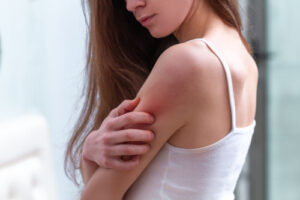Improving Eczema & Skin Health through Acupuncture

Eczema is a common skin condition that causes patches of dry, itchy skin and a red rash on different parts of your body. Eczema symptoms can be triggered by your body’s natural immune response to certain proteins. Both home remedies and prescription treatment plans may be part of managing eczema symptoms[1].
In recent years, acupuncture and related treatments have gotten some attention as possible ways to treat symptoms of eczema, particularly the symptom of itching. Acupuncture is a form of traditional Chinese medicine that involves puncturing specific areas on the body, known as acupuncture points, with hair-thin metallic needles. It is thought that by stimulating specific points, the body’s central nervous system activates in a way that releases particular chemicals designed to enable healing throughout the body[2].
How It Works
Acupuncture for eczema works by controlling the immune system’s response to its triggers reducing flare-ups, and treating lesions and itching. More specifically, it can restore the skin barrier, improve overall skin health, and relieve the discomfort of eczema.
Some related treatments that can be used along with acupuncture for eczema are:
- Cupping: This is a technique that involves placing heated cups on the skin to create suction. Cupping can help improve blood circulation, reduce inflammation, and promote healing of the skin.
- Electro-Acupuncture: This is a variation of acupuncture that involves applying a mild electric current to the needles inserted into the acupuncture points. Electro-acupuncture can enhance the effects of acupuncture by stimulating the nerves and muscles more effectively.
- Moxibustion: This is a technique that involves burning a dried herb called mugwort near the skin or on the acupuncture needles. Moxibustion can help warm up the body, regulate the immune system, and relieve pain and itching.
- Gua Sha: This is a technique that involves scraping the skin with a smooth-edged tool to create redness and bruising. Gua Sha can help release toxins, improve blood flow, and reduce inflammation and itching.
- Herbal Remedies: These are natural substances derived from plants that can be taken orally or applied topically to treat various health conditions. Herbal remedies can help balance the body’s energy, nourish the skin, and reduce inflammation and itching.
Study Data

There is some evidence from 2012 that acupuncture can help treat allergy symptoms, which are often related to eczema. A small study published in 2012 showed that acupuncture lowered the intensity of eczema-related itching better than placebo and no treatment. The study suggested that part of the reason acupuncture reduced itch was that it provided a distraction from the itching sensation. Another small study published in 2019 found that acupuncture improved symptoms of mild to moderate eczema, especially when it came to controlling itchiness.
However, there’s not a lot of evidence that acupuncture and related treatments can help relieve other symptoms of eczema, such as redness or dry patches of skin. A 2015 review of studies noted that no large-scale studies prove that acupuncture is an effective way of managing other eczema symptoms or that it can decrease eczema symptoms with repeated treatments over time.
Therefore, acupuncture and related treatments should not be considered as a substitute for conventional medical care for eczema, but rather as complementary therapies that may offer some relief and improvement for some people. If you are interested in trying acupuncture or related treatments for eczema, you should consult with your doctor first and find a licensed and trained acupuncturist who has experience in treating skin conditions.
Acupuncture and related treatments may not work for everyone with eczema, but they may be worth a try if you are looking for natural and holistic ways to improve your skin health and quality of life.
The Many Other Benefits of Acupuncture
Acupuncture is not only a way to treat eczema symptoms, but also a way to improve your overall health and well-being. Acupuncture has been used for over 2,500 years as a part of traditional Chinese medicine, and it has been shown to have various benefits for different conditions and ailments.
Some of the benefits of acupuncture are:
- Pain relief: Acupuncture can help reduce pain from various sources, such as arthritis, lower back pain, headache, fibromyalgia, and osteoarthritis. Acupuncture may stimulate the release of endorphins, the body’s natural pain-relieving chemicals, and influence the autonomic nervous system, which can affect breathing, blood pressure, and heart rate.
- Mental health: Acupuncture can help improve mental health by reducing stress, anxiety, and depression. Acupuncture may regulate the levels of neurotransmitters such as serotonin and dopamine, which are involved in mood regulation and emotional well-being.
- Sleep quality: Acupuncture can help improve sleep quality by promoting relaxation and addressing the underlying causes of insomnia, such as pain, stress, or hormonal imbalance. Acupuncture may also affect the production of melatonin, a hormone that regulates the sleep-wake cycle.
- Allergy relief: Acupuncture can help relieve allergy symptoms such as sneezing, runny nose, and itchy eyes by modulating the immune system’s response to allergens. Acupuncture may also prevent allergy attacks by strengthening the body’s resistance to environmental triggers.
- Infertility treatment: Acupuncture can help improve fertility by enhancing blood flow to the reproductive organs, balancing hormones, reducing stress, and improving the quality and quantity of eggs and sperm. Acupuncture may also increase the chances of success for assisted reproductive technologies such as in vitro fertilization (IVF).
- Addiction recovery: Acupuncture can help with addiction recovery by reducing cravings, withdrawal symptoms, and relapse rates for substances such as nicotine, alcohol, opioids, and cocaine. Acupuncture may stimulate the release of endorphins that can counteract the effects of addictive substances and provide a natural reward system.
- Skin appearance: Acupuncture can help improve skin appearance by increasing blood circulation, collagen production, and skin elasticity. Acupuncture may also reduce inflammation, acne, wrinkles, and sagging skin by balancing hormones and regulating the internal organs that affect skin health.
Acupuncture is a safe and effective way to enhance your health and wellness. By stimulating specific points on your body with thin needles, acupuncture can balance your energy flow and activate your natural healing potential. Whether you want to treat a specific condition or just improve your overall well-being, acupuncture may be a valuable option for you.
What Happens When You Call Accurate Acupuncture?
For your first appointment, plan to spend between 60 and 90 minutes with us. We will discuss your medical history, experience with acupuncture, current issues, and what you hope to accomplish with treatment. We will also explain our procedures to help you feel comfortable and secure during your session.
It’s important to note that chronic conditions typically require a series of treatments before patients experience noticeable, lasting relief of symptoms. In other words, bring an open mind to your session and give the treatment time to work.
If you’re ready to learn more, feel free to call our office any time. Or, complete our contact form and we’ll answer your question and help you book an appointment.
